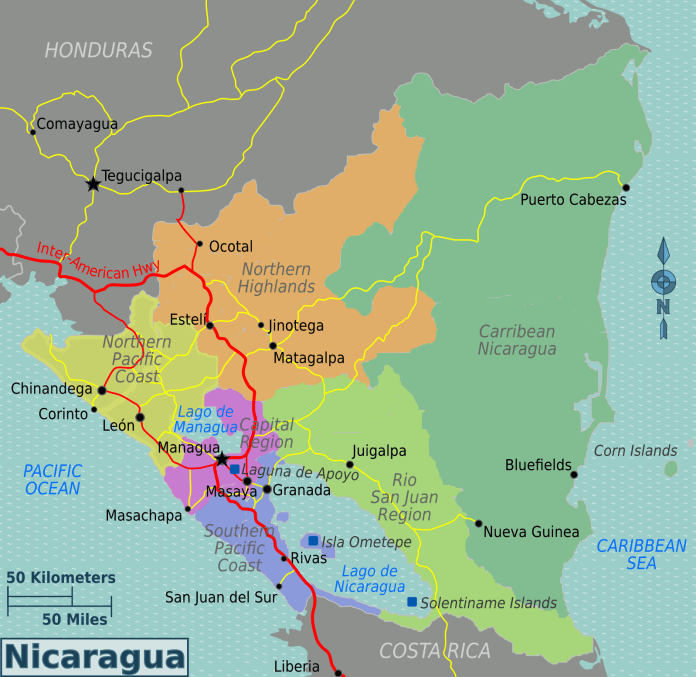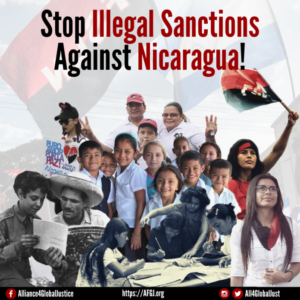New U.S. Sanctions Are Designed to Hit Nicaragua’s Poorest Citizens
LATIN AMERICA AND THE CARIBBEAN, 7 Nov 2022
John Perry | CovertAction Magazine - TRANSCEND Media Service
Mainstream media ridiculously claim that Nicaragua is a threat to U.S. national security when it has one of the lowest levels of defense spending in the world.
4 Nov 2022 – The Biden administration has announced new sanctions which are intended to hit the poorest Nicaraguans—both in their pockets and in the public services on which they depend.
This latest attack on a small Central American country is, as usual, dressed up as promoting democracy: The sanctions will “deny the Ortega-Murillo regime the resources they need to continue to undermine democratic institutions in Nicaragua.” But everyone knows the real target is ordinary Nicaraguans who voted overwhelmingly to return a Sandinista government in last year’s elections.
Anyone seeing the NPR news item on the sanctions will have read that they are aimed at “Nicaragua’s gold industry,” with an implicit message that this hits President Daniel Ortega’s personal treasure chest. The reality is very different.
Gold mining in Nicaragua—generally speaking carried out in less environmentally damaging ways than in most other countries—is a big export industry, employing thousands of people in one of the country’s poorest regions. It also generates significant tax income for the government, which helps fund its enormous social programs.

The sanctions affect not just the gold mining business but all the individuals involved in its management. The obvious aim is to scare away the industry’s investors, administrators and technicians: Put your money in Nicaragua and lose any assets you have in U.S. banks, is the implicit message.
Was it a coincidence that the sanctions were announced on the same day that the Sandinista government presented its annual budget for 2023? The budget is 14% higher than this year’s, with more than half of the expenditures devoted to social investment. Included in this are the construction of no fewer than nine new public hospitals, adding 4,300 homes to the stock of social housing, bringing electricity to an extra 35,000 households and massive improvements in water and sanitary services.
Much of the new investment is directed toward the country’s under-resourced Caribbean regions, now properly connected to the main population centers on the Pacific coast by recently completed highways and the huge new River Wawa bridge.

These regions are a priority—in part—because they were heavily damaged by recent hurricanes. The government’s careful plans to protect people and rebuild affected settlements helped secure the highest levels of support for Daniel Ortega in any region during last year’s elections.
Is it another coincidence that these are the areas where gold mining is a major source of employment, now to be the specific target of U.S. sanctions?
The NPR article repeats the Trump-era argument that Nicaragua is “a threat to U.S. national security.” This ridiculous claim, rolled out again to justify Biden’s latest actions, has no basis in reality. Nicaragua is one of Latin America’s smallest and poorest countries, with a population of under seven million, one of the lowest levels of defense spending in the world and a gross national product equivalent only to that of a mid-sized U.S. city. The idea that it threatens the security even of its neighbors is absurd, much less that of the United States.

The State Department’s press release discloses another reason for the sanctions: Nicaragua’s alliance with Russia. Behind this is Washington’s fear that Latin American countries, and not only those with left-wing governments, are building closer ties both with Moscow and with Beijing.

A second message is: Make alliances with our enemies and you will be punished. Within this is a third implicit message: You may think you are a sovereign state, but according to the “rules-based international order” where we decide the rules, you must do as we say.
More U.S. Political Interference—in Honduras
As I write this, news comes about another example of U.S. interference in the affairs of another country, this time in neighboring Honduras.
The U.S. ambassador, Laura Dogu, is trying to protect the interests of U.S. companies involved in unconstitutional projects known as “ZEDE”s, or model cities, set up by the previous corrupt government, replaced in January by the progressive President Xiomara Castro.


Castro’s foreign minister has formally requested Dogu’s attendance to explain why she is trying to undermine government attempts to re-establish the rule of law in the zones where the ZEDEs were set up, and why she opposes Castro’s other measures to clear up the previous government’s corruption. As a previous ambassador to Nicaragua, Dogu was involved in similar interference there.
In yet another recent example, The Intercept has just revealed that, in a report to the U.S. Congress, the Biden administration continues to endorse claims of electoral fraud in Bolivia’s 2019 election, which at the time opened the door for a right-wing takeover of the government that lasted until near the end of 2020.

As it happens, the left-wing governments in both Honduras and Bolivia are currently under threat from the right. In Bolivia, the opposition has mounted a general strike in the rich region of Santa Cruz.
In Honduras, opposition politicians are calling for their supporters to have ready their ”white shirts,” a symbol of support for disgraced former president Hernandez and the corrupt clan that surrounded him. This is precisely the moment when Washington should be supporting elected governments with whom they may have disagreements, but not undermining them. Or isn’t this what the State Department means when it “promotes democracy”?

These actions are part of a wider failure on Biden’s part to come to grips with the renewed emergence of progressive governments in Latin America. The most notable recent example of this was, of course, the embarrassing Summit of the Americas in Los Angeles, which many of the continent’s governments boycotted.
Since then, Colombians have elected the progressive Gustavo Petro as president and Brazilians are, at the second attempt, returning to power their former president, Luiz Inácio Lula da Silva, “Lula,” who is also progressive.
In an article for Al Jazeera, Canadian academic John Kirk recently wrote that “it is time for the U.S. to recognize that Latin America is being transformed, and the leftist activism of the 2020s represents a clear rejection of the policies of recent decades.”
He argues that the region is open to dialogue with the U.S., but this has to be a respectful exchange of opinions, not “a top-down lecture.” He may be right: Despite heavy sanctions Venezuela has engaged in spasmodic dialogue with Washington and also, to the limited extent possible, has Cuba.
Nicaragua, on the other hand, recently refused to accept a new U.S. ambassador, Hugo Rodriguez, after he promised the U.S. Congress that he would “support using all economic and diplomatic tools to bring about a change in direction in Nicaragua.”
He went on to call Nicaragua a “pariah state,” displaying precisely the arrogance that Kirk described as the obstacle to any sensible dialogue between Washington and its southern neighbors.

Meanwhile, Russia and China (and, indeed, other major states such as India, Japan and South Korea), offer development assistance free of the “top-down lectures” and “democracy promotion” which Washington believes it is entitled to employ. Until successive U.S. governments learn to behave otherwise, they will continue to lose friends in Latin America rather than make new ones.
_______________________________________________
 John Perry is based in Masaya, Nicaragua and writes for the Council on Hemispheric Affairs, London Review of Books, FAIR and elsewhere. He can be reached at johnperry4321@gmail.com
John Perry is based in Masaya, Nicaragua and writes for the Council on Hemispheric Affairs, London Review of Books, FAIR and elsewhere. He can be reached at johnperry4321@gmail.com
Go to Original – covertactionmagazine.com
Tags: Anglo America, Anti-imperialism, Collective Punishment, Corruption, Hegemony, Imperialism, Inequality, Latin America Caribbean, Nicaragua, Sanctions, USA
DISCLAIMER: The statements, views and opinions expressed in pieces republished here are solely those of the authors and do not necessarily represent those of TMS. In accordance with title 17 U.S.C. section 107, this material is distributed without profit to those who have expressed a prior interest in receiving the included information for research and educational purposes. TMS has no affiliation whatsoever with the originator of this article nor is TMS endorsed or sponsored by the originator. “GO TO ORIGINAL” links are provided as a convenience to our readers and allow for verification of authenticity. However, as originating pages are often updated by their originating host sites, the versions posted may not match the versions our readers view when clicking the “GO TO ORIGINAL” links. This site contains copyrighted material the use of which has not always been specifically authorized by the copyright owner. We are making such material available in our efforts to advance understanding of environmental, political, human rights, economic, democracy, scientific, and social justice issues, etc. We believe this constitutes a ‘fair use’ of any such copyrighted material as provided for in section 107 of the US Copyright Law. In accordance with Title 17 U.S.C. Section 107, the material on this site is distributed without profit to those who have expressed a prior interest in receiving the included information for research and educational purposes. For more information go to: http://www.law.cornell.edu/uscode/17/107.shtml. If you wish to use copyrighted material from this site for purposes of your own that go beyond ‘fair use’, you must obtain permission from the copyright owner.
One Response to “New U.S. Sanctions Are Designed to Hit Nicaragua’s Poorest Citizens”
Read more
Click here to go to the current weekly digest or pick another article:
LATIN AMERICA AND THE CARIBBEAN:

Interesting John…While I heartily agree that the US has been and continues to be the chief war monger among us it’s important to get the facts straight no matter who our favorite players are…As I recall the last election in Nicaragua there were no viable opposition leaders opposing Ortega. Why? Perhaps you know better than I do. On the ground fact is that thousands had left the country after the “uprising” in 2018…and many more withheld their vote…Many have been jailed and have been tortured. That continues. I can attest to those travesties as I have treated several of them for trauma, anxiety and depression…I could go on but the disc was worn thin years ago. Selfishness and greed abound. Nothing new there. What is new is that perhaps folks all around the world are waking up…as if from a dream. Forget the ideologies…forget the theocracies and family dynasties…and commit to something more profound and long lasting than the trinkets of capitalism…like basic goodness and integrity in politics..But all this may be irrelevant chatter as I truly believe that planetary changes will cut through the icing on the cake and bring us to our knees..no matter what color underwear we have on..then perhaps we will have to care for each other…Choice point